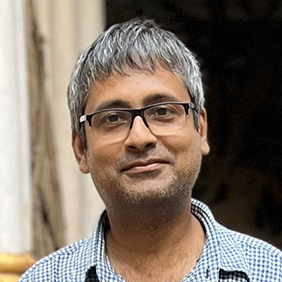2024 JFIPP Research Fellow - Rupak Goswami

Rupak Goswami
Associate Professor, Ramakrishna Mission Vivekananda Educational and Research Institute (RKMVERI)
[Project Title]
Examining stakeholders' cognitive maps and policy networks to achieve inclusive policy coordination for climate-smart agriculture in the Indo-Pacific
Project Summary
The geographically diverse and geopolitically important Indo-Pacific region serves as a compelling case for understanding the policymaking process related to Climate-Smart Agriculture (CSA) due to the region's shared vulnerability to climatic uncertainties. Climatic perturbation in the region can cause long-term cascading impacts on food security, energy transformation, international trade, human migration, and regional stability. This underscores the urgent need for CSA policy alignment through coordinated, climate-sensitive transformations in agrifood systems. However, CSA policies are primarily shaped by complex geopolitical and socio-cultural factors entrenched in a region's agricultural political economy. Thus, aligning climate policies and actions across the Indo-Pacific requires transcending the technological and diplomatic discourses on CSA policy, and understanding the diverse thinking styles and decision-making processes of stakeholders. Unlike many data-hungry policy research approaches, we propose exploring the CSA-related policy decisions of diverse local, regional, and global actors from a foundational cognitive perspective. We aim to reveal the complex worldviews of stakeholders that help us understand the `who', `how', and `with what outcome' of CSA policy-making in the Indo-Pacific. By employing the novel, semi-quantitative knowledge elicitation approach called Fuzzy Cognitive Mapping (FCM), alongside social network analysis (SNA) and qualitative narrative and document analyses across Japan, Australia, the USA, and India, among others, we aim to explore the interpretations of CSA among diverse stakeholders, understand the structure of stakeholders' logic (cognitive maps) concerning CSA policy-making and develop a shared decision-making model for the Indo-Pacific. We identify similarities and dissimilarities of stakeholders' and nations' cognitive maps to resolve differences and simulate the outcomes of agreed CSA policy scenarios. Further, we analyze the evolution of CSA policy networks across the Indo-Pacific to understand the dynamics of regional policy-making. The study outcomes will help us resolve regional and stakeholder differences and align the CSA policy-making in the Indo-Pacific, respecting national and global commitments.
- What We Do Top
- Arts and Cultural Exchange [Culture]
- Japanese-Language Education Overseas [Language]
- Japanese-Language Education Overseas [Language] Top
- Learn Japanese-language
- Teach Japanese-language
- Take Japanese-Language Test
- Know about Japanese-language education abroad
- The Japanese-Language Institute, Urawa
- The Japanese-Language Institute, Kansai
- Japanese-Language Programs for Foreign Specified Skilled Worker Candidates
- Japanese Language Education for Japanese Children Resident Overseas and for the Descendants of Migrants
- Archives
- Japanese Studies and Global Partnerships [Dialogue]
- JF digital collection
- Other Programs / Programs to Commemorate Exchange Year
- Awards and Prizes
- Publications
